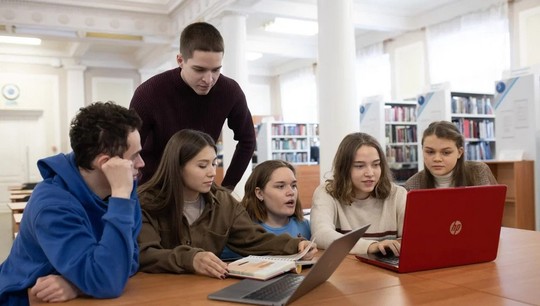Ural Federal University: Open Education Platform Association Develops Cooperation with Universities in Dagestan
Rectors of the higher education institutions of the Russian Federation, members of the National Open Education Platform Association, met with Sergey Melikov, the head of the Republic of Dagestan, in Moscow. The sides reached an agreement on the issues of access to the unique developments of the platform, technical services of the National Open Education Platform (NOEP) – proctoring, digital profile of the student, analytical services, etc. As part of the Open Education project, Ural Federal University presents courses primarily providing basic training in engineering fields. Currently, million students choose the online courses of the university.
The participants discussed the most topical issues: the digital transformation of the education system and online learning opportunities, which is acknowledged not to replace basic education, but to strengthen it with interactive online practices based on the latest innovative electronic services and digital technologies.
The meeting resulted in the signing of a cooperation agreement. All universities of the Republic of Dagestan, students and teachers of higher education institutions will be connected to the resources of the platform.
“On behalf of the university community of the country I thank the leadership of the Republic of Dagestan for their systematic attention to the problems of education. I know that the outgoing year 2022 was declared the Year of Education in the region, and both the government and the universities of the republic are actively working in this direction. Today’s meeting, dedicated to signing the agreement between the Republic of Dagestan and our common university brainchild, the National Open Education Platform, is another proof of this. This will allow all universities and students in the region to have access to the resources of the platform, teachers will use online technologies, improve their competencies and qualifications by supplementing traditional classroom instruction with distance learning formats,” said Viktor Sadovnichiy, President of the Russian Union of Rectors and Rector of Moscow State University.
Viktor Sadovnichiy also said that in 2020, during the critical period of the pandemic, the platform opened free access to all the hosted courses for representatives of all universities of the Russian Federation. During the spring semester of 2020, more than 100 universities and more than 50,000 students took advantage of this opportunity. And on March 5, 2022, when the foreign platforms Coursera and edX announced a freeze of cooperation with Russian universities and closed access to educational materials for Russian users, the platform «Open Education» lent its shoulder to Russian universities during the difficult period, providing the opportunity to transfer courses to it.
“The Republic of Dagestan has a great serious educational, scientific and youth potential, which today we strive to reveal as much as possible. Within the framework of the Year of Education in the Republic of Dagestan we conducted a thorough audit of the entire educational system of the region, all its levels and components. According to its results we came to the conclusion that some education fields need to be reformed in terms of demand from the productive forces, economic development, the presence of new challenges and threats from the outside,” stressed Sergey Melikov.
For example, the republic is actively developing the sphere of tourism, including organized tourism.
“This requires a completely new approach, including a scientific approach, to improve the quality of training of the industry’s employees. According to the decision of Head of State, a new all-Russian children’s center will be created on the Caspian Sea. New approaches and potentials should be found for it, it will not be realized without science. Based on the National Open Education Platform, in the region we are ready to use all the best that it is ready to give to our students, ready to work actively under its aegis,” concluded Sergey Melikov.

